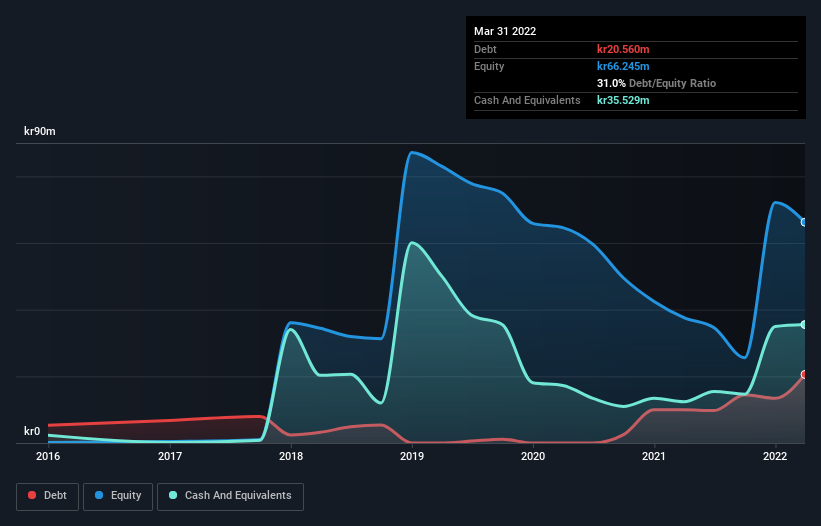Howard Marks put it nicely when he said that, rather than worrying about share price volatility, 'The possibility of permanent loss is the risk I worry about... and every practical investor I know worries about.' So it might be obvious that you need to consider debt, when you think about how risky any given stock is, because too much debt can sink a company. Importantly, FlexQube AB (publ) (STO:FLEXQ) does carry debt. But is this debt a concern to shareholders?
When Is Debt Dangerous?
Debt is a tool to help businesses grow, but if a business is incapable of paying off its lenders, then it exists at their mercy. Part and parcel of capitalism is the process of 'creative destruction' where failed businesses are mercilessly liquidated by their bankers. However, a more frequent (but still costly) occurrence is where a company must issue shares at bargain-basement prices, permanently diluting shareholders, just to shore up its balance sheet. Of course, the upside of debt is that it often represents cheap capital, especially when it replaces dilution in a company with the ability to reinvest at high rates of return. The first thing to do when considering how much debt a business uses is to look at its cash and debt together.
View our latest analysis for FlexQube
How Much Debt Does FlexQube Carry?
As you can see below, at the end of March 2022, FlexQube had kr20.6m of debt, up from kr10.00m a year ago. Click the image for more detail. However, it does have kr35.5m in cash offsetting this, leading to net cash of kr15.0m.

A Look At FlexQube's Liabilities
According to the last reported balance sheet, FlexQube had liabilities of kr64.5m due within 12 months, and liabilities of kr7.32m due beyond 12 months. On the other hand, it had cash of kr35.5m and kr33.2m worth of receivables due within a year. So its liabilities outweigh the sum of its cash and (near-term) receivables by kr3.17m.
This state of affairs indicates that FlexQube's balance sheet looks quite solid, as its total liabilities are just about equal to its liquid assets. So it's very unlikely that the kr449.5m company is short on cash, but still worth keeping an eye on the balance sheet. Despite its noteworthy liabilities, FlexQube boasts net cash, so it's fair to say it does not have a heavy debt load! There's no doubt that we learn most about debt from the balance sheet. But it is future earnings, more than anything, that will determine FlexQube's ability to maintain a healthy balance sheet going forward. So if you're focused on the future you can check out this free report showing analyst profit forecasts.
Over 12 months, FlexQube reported revenue of kr143m, which is a gain of 99%, although it did not report any earnings before interest and tax. With any luck the company will be able to grow its way to profitability.
So How Risky Is FlexQube?
We have no doubt that loss making companies are, in general, riskier than profitable ones. And the fact is that over the last twelve months FlexQube lost money at the earnings before interest and tax (EBIT) line. And over the same period it saw negative free cash outflow of kr38m and booked a kr22m accounting loss. With only kr15.0m on the balance sheet, it would appear that its going to need to raise capital again soon. FlexQube's revenue growth shone bright over the last year, so it may well be in a position to turn a profit in due course. By investing before those profits, shareholders take on more risk in the hope of bigger rewards. The balance sheet is clearly the area to focus on when you are analysing debt. However, not all investment risk resides within the balance sheet - far from it. For example, we've discovered 5 warning signs for FlexQube (1 doesn't sit too well with us!) that you should be aware of before investing here.
If, after all that, you're more interested in a fast growing company with a rock-solid balance sheet, then check out our list of net cash growth stocks without delay.
New: AI Stock Screener & Alerts
Our new AI Stock Screener scans the market every day to uncover opportunities.
• Dividend Powerhouses (3%+ Yield)
• Undervalued Small Caps with Insider Buying
• High growth Tech and AI Companies
Or build your own from over 50 metrics.
Have feedback on this article? Concerned about the content? Get in touch with us directly. Alternatively, email editorial-team (at) simplywallst.com.
This article by Simply Wall St is general in nature. We provide commentary based on historical data and analyst forecasts only using an unbiased methodology and our articles are not intended to be financial advice. It does not constitute a recommendation to buy or sell any stock, and does not take account of your objectives, or your financial situation. We aim to bring you long-term focused analysis driven by fundamental data. Note that our analysis may not factor in the latest price-sensitive company announcements or qualitative material. Simply Wall St has no position in any stocks mentioned.
About OM:FLEXQ
FlexQube
Designs, develops, and sells flexible and robust industrial carts and robots for material handling in the United States, Mexico, Germany, the United Kingdom, and Sweden.
Adequate balance sheet with low risk.
Market Insights
Community Narratives





